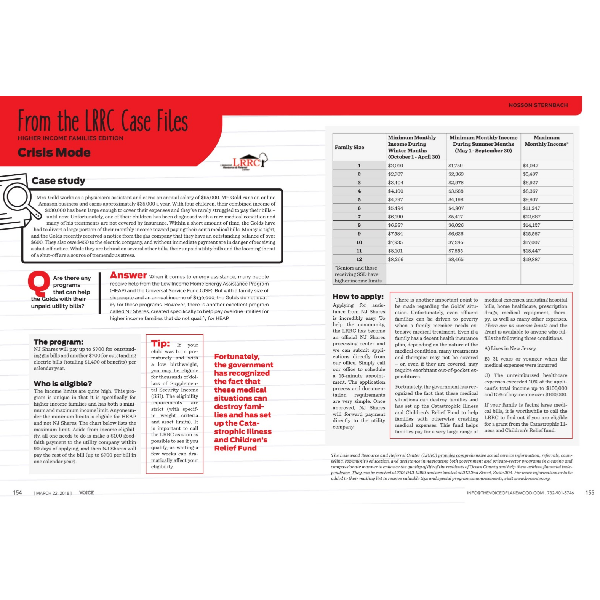
From the LRRC Case Files - High Income Edition - Week 2
Case
Mrs. Gold works as a Physician's Assistant and has an annual salary of $95,000. Mr. Gold runs an online Amazon business and earns approximately $35,000 a year. With four children, their combined income of $130,000 was large enough to cover their expenses, and they rarely struggled to pay their bills. Unfortunately, one of their children was diagnosed with a rare medical condition and many of his treatments were not covered by insurance. Within a short amount of time, the Golds found that a large portion of their monthly income had to be diverted towards paying their sons medical bills. Money became tight, and the Gold's recently received a notice from the gas company that they have an outstanding balance of over $600. They also owe $450 to the electric company, and without immediate payment are in danger of receiving a shut-off notice. While they are behind on a number of other bills, their unpaid utility bills and the looming threat of a shut-off are a source of tremendous stress for them right now.
Question: Are there any programs that can help the Gold's with their unpaid utility bills?
Answer: Some families qualify for energy assistance from Low Income Home Energy Assistance Program (HEAP) and the Universal Service Fund (USF). With a family size of six people and an annual income of $130,000, the Gold's do not qualify for these programs. However, there is another amazing program called NJ Shares created specifically to help pay overdue utilities for higher income families that do not qualify for HEAP.
The program: NJ Shares will pay up to $700 for outstanding gas bills and another $700 for outstanding electric bills (totaling $1,400 of benefits) per calendar year. Who is eligible? The income limits are quite high. This program is unique in that it is specifically for higher income families and has both a minimum and maximum income limit. Anyone under the minimum limits is eligible for HEAP and not NJ Shares. The chart below lists the maximum limit. Aside from income eligibility, all one needs to do is make a $100 good-faith payment to the utility company within 90 days of applying, and then NJ Shares will pay the rest of the bill (up to $700 per bill in one calendar year.) The bill must be in your name and you must reside at the address on the bill.
How to apply: Applying for assistance from NJ Shares is incredibly easy. To help the community, the LRRC has become an official NJ Shares processing center and we can submit applications directly from our office. Simply call our office to schedule a 15 minute appointment. The application process and documentation requirements are very simple. Once approved, NJ Shares will forward payment directly to the Utility Company.
There is another important point to be made regarding Gold's story. Unfortunately, even affluent families can be driven to poverty when one of the family members needs extensive medical treatment. Even if a family has a decent health insurance plan, depending on the nature of the medical condition, many treatments and therapies may not be covered, or, even if they are covered, may require exorbitant out of pocket expenditures. Fortunately, the government has recognized the fact that these medical situations can destroy families and has set up the Catastrophic Illness and Children's Relief Fund to help families with otherwise crushing medical expenses. This fund helps families pay for a very large range of medical expenses, including, hospital bills, home health care, prescription drugs, medical equipment, therapy, as well as many other expenses. There are no income limits and the grant is available to anyone who fulfills the following three conditions:
- Lives in New Jersey
- Is 21 years or younger when the medical expenses were incurred
- The unreimbursed healthcare expenses exceeded 10% of the applicant's total income up to $100,000 and 15% of any income over $100,000.
If your family is facing large medical bills it is worthwhile to call the LRRC to find out if you are eligible for a grant from the Catastrophic Illness and Children's Relief fund.
Tip: If your child was born prematurely and with a low birth weight, you may be eligible for thousands of dollars of Supplemental Security Income (SSI). The eligibility requirements are strict (with specific weight criteria and asset limits). It is important to call the LRRC as soon as possible to see if you qualify, as waiting a few weeks can dramatically affect your eligibility.



